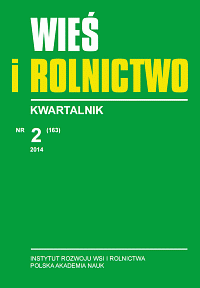Społeczne wyobrażenia wsi na przełomie XX i XXI wieku
Social conceptions of rural culture at the turn of the 20th and 21st centuries
Author(s): Roch SulimaSubject(s): Social Sciences
Published by: Instytut Rozwoju Wsi i Rolnictwa Polskiej Akademii Nauk
Keywords: social mythologies; folk culture; popular culture; postmodernity; folklore cultural animation; per formative ethnography; tradition and cultural memory; mitologie społeczne; kultura ludowa; kultura popularna; ponowoczesność; folkloryzm; animacja kultury
Summary/Abstract: The article aims to present fundamental changes in the repertoire and the communicative circulation of “social conceptions” (mythical images) of Polish rural areas at the turn of the 20th and 21st centuries. “Social conceptions”, (a notion developed by Bronisław Baczko), function as “ideas-images” which serve as symbolic representations and projections of reality, regulating and modelling its perception. The “social conceptions” of rural areas have recently lost their ideological aspect – they have transformed into myths of popular and consumer culture. What is more, they constitute an attractive material for a typically postmodern process of the aesthetization of culture. The still distinct rural countryside and its type of culture have become a place for animative activities and aesthetic experiences in the 21st century; a phenomenon perhaps best described by per formative ethnography. The significant transformation of the meanings of t Polish rural mythology harmonize with intensifying identity discourses and with a Polish version of post-colonialism, which portrays images of peasant “exploitation”, and treats them as a characteristic trait of Polish history. Artykuł ma na celu pokazanie zasadniczych zmian repertuaru oraz podstawowych obiegów komunikacyjnych „wyobrażeń społecznych” (zmityzowanych obrazów) polskiej wsi na przełomie XX i XXI wieku. „Wyobrażenia społeczne” to – za Bronisławem Baczką – „idee-obrazy”, które są symboliczną reprezentacją i projekcją rzeczywistości, wobec której pełnią funkcje regulujące i modelujące. „Wyobrażenia społeczne” wsi tracą wykładnię ideologiczną, stają się mitami kultury popularnej oraz konsumpcyjnej, stanowią też atrakcyjne tworzywo, charakterystycznych dla ponowoczesności, procesów estetyzacji kultury. Wieś jako wciąż inny typ krajobrazu i kultury staje się w XXI wieku przestrzenią działań animacyjnych i zdarzeń estetycznych, które stosunkowo najpełniej opisuje etnografia performatywna. Istotne przemiany znaczeń polskich mitologii wsi współbrzmią z intensyfikacją dyskursów tożsamościowych oraz polskiej wersji postkolonializmu, która eksponuje obrazy „krzywdzonej” chłopskości, traktowanej jako charakterystyczny rys polskich dziejów.
Journal: Wieś i Rolnictwo
- Issue Year: 163/2014
- Issue No: 2
- Page Range: 57-63
- Page Count: 7
- Language: Polish

